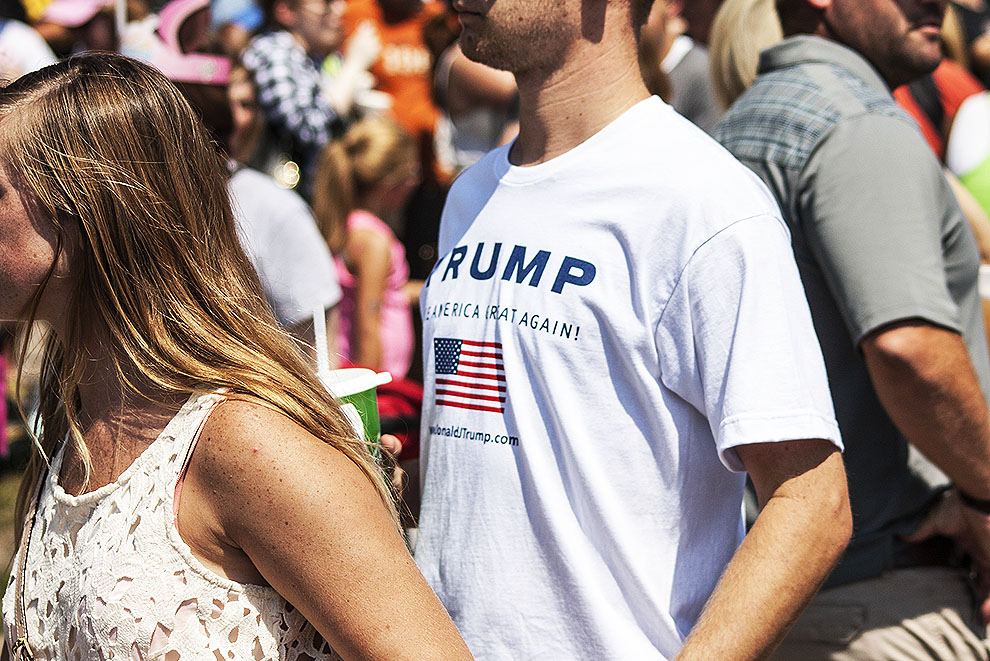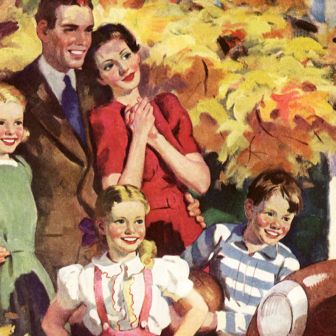In Arthur Conan Doyle’s story “Silver Blaze,” the plodding policeman, Inspector Gregory, is poring over clues to explain the mysterious disappearance of a valuable racehorse. Sherlock Holmes remarks that the crucial feature of the case is “the curious incident of the dog in the night-time.” Gregory says, in bemusement, “The dog did nothing in the night-time,” to which Holmes responds, “That was the curious incident.”
The discussion of the US election outcome has missed the point in a similar fashion. A great deal of attention has been paid to the 2 to 4 per cent of voters who gave Trump his margin of victory, either by switching from Obama or by failing to vote. With such a narrow margin, it’s easy to assign blame (or credit, for those who welcome this disaster) to lots of different groups or to specific decisions made by the Clinton campaign.
The dominant analysis, despite the absence of much in the way of supporting evidence, is that a crucial swing occurred among the “white working class.” But in American electoral parlance, “working class” refers to voters without a college degree, a definition that includes many small businesspeople, and correlates with age, rural location and Southernness at least as much as with class in the economic sense of the term. These less-educated whites have been shifting towards the Republicans for decades, even as the Republican Party pushed globalisation, free trade and tax cuts for the rich. There’s no real evidence that Trump accelerated the shift.
The dog that didn’t bark in this case was the (assumed) majority of “decent Republicans” to whom Clinton sought to appeal. Although most observers (including me) assumed that many of them would turn against Trump, hardly any did so.
According to exit polls, nearly 90 per cent of self-described Republicans voted for Trump, very similar to the proportion in previous elections. And, while turnout was down on both sides, the decline was worse for the Democrats. Trump’s support was similarly strong among those nominal independents who describe themselves as “Republican leaning.”
Moreover, the third-party Libertarian candidacy of Gary Johnson went nowhere, ending up with a derisory 3 per cent of the vote, at least some of which came from disgruntled Democrats. Deducting the 1 per cent Johnson got in 2012, it’s unlikely that more than 1 per cent of votes came from Republicans unwilling to support Trump.
The party establishment mirrored the actions of the base. Many prominent Republicans expressed unease with Trump; a much smaller number said they wouldn’t vote for him; and hardly any went so far as to advocate a vote for Clinton. An article in the Atlantic, published in August, claimed there was “a small, but growing, number of Republicans” for Clinton, but cited only five names, all of them obscure. As far as I can tell, the only senior Republican to support Clinton was Colin Powell.
On the face of it, this is a surprising outcome. Trump did and said much that ought to have made him unacceptable to what have been seen as the core constituencies of the Republican Party. His obvious lack of religious belief and flagrantly immoral behaviour ought to have provoked defections from evangelical religions. His denunciation of trade and willingness to engage in massive public spending went against decades of Republican orthodoxy. Added to this, his overt racism and misogyny ought to have been disqualifying for the supposedly large number of Republicans committed to diversity and social equality.
Most striking, perhaps, was the absence of any significant movement among the “socially liberal and fiscally conservative” voters who play a role in US political mythology similar to that of Western Sydney voters in Australia. These voters should have supported Clinton en masse, but were nowhere to be seen.
In part, the willingness of the Republican Party to unify behind Trump reflects deep personal hatred of Clinton. This hatred is real, if difficult to explain. Clinton is a cautious, compromising politician who has frequently blurred the line between political action and personal enrichment. But in a country where the majority of elected politicians are millionaires, and the revolving door between politics and business has been in operation for decades, she’s no better or worse than the average politician, including past aspirants to the presidency.
In any case, there would certainly have been plenty of hatred for Sanders (a socialist Jew, originally from New York), or for anyone else the Democrats ran. There have been few US leaders more appealing to the world as a whole than Barack Obama, but the vitriol aimed at him has been stunning. One poll found that 57 per cent of Republicans believed him to be a secret Muslim, and 24 per cent thought he might be the Antichrist.
It’s unlikely that many of the poll respondents actually believed their answers to be true, any more than they believe in the literal truth of Trump’s promise to make Mexico pay for his wall. Rather, these statements were shibboleths, statements of tribal affinity. The same is true of the vote for Trump. In the end, Trump’s willingness to stand up for the tribe counted for more than his obvious personal unfitness and his many policy heresies.
This tribalism is part of a global trend, reflecting the collapse of the dominant ideology of neoliberalism (or, to use a less pejorative term, market liberalism) in the wake of the global financial crisis. Neoliberalism is a complex mixture of ideology and class interests, but its central theme is the inevitability and desirability of a globalised capitalism, dominated by the financial sector.
Since the breakdown of the postwar social democratic consensus in the 1970s, political power in developed countries has typically involved alternation between two versions of neoliberalism. The hard version, represented in the United States by the Republican Party, has sought an economy dominated entirely by capital, and a rolling back of government, trade unions and any restrictions on the maximisation of wealth. The soft version, exemplified by Bill Clinton’s “third way” appeal in the 1990s, also places its trust in financial markets and globalisation, but seeks to preserve a limited degree of redistribution, to promote education and social mobility, and to limit the environmental and social damage caused by unfettered capitalism.
Neither version of neoliberalism commanded mass political support. On the right, Republicans and other hard neoliberals relied on coded appeals to tribalism, directed mainly at white Christians who could be encouraged to blame their relative (and sometimes absolute) decline on various out-groups (immigrants, racial minorities, “urban elites” and so on), while pursuing the very policies that caused the problems. On the left, while voters were generally hostile to market liberalism, they had “nowhere else to go,” and could be induced to support soft neoliberalism with a combination of progressive social policies and fear of the right. Overall, the hard neoliberals tended to win elections more often than not, while the left struggled over how to respond to the decline of the old social democratic order and the rise of the financial sector.
This system has now broken down. Tribalist voters, no longer content with rhetorical scraps, have overthrown the neoliberal establishment, which has completely capitulated to Trumpism. In Britain, the Brexit referendum produced the downfall of the seemingly invulnerable hard neoliberalism of Cameron and Osborne. The new PM, Theresa May, has softened their free-market domestic policies while hardening controls on immigration, taking the risk that the latter may lead to exclusion from the European market.
The same tendencies are equally evident in Australia. The consummate neoliberal, Malcolm Turnbull, is little more than a marionette, with his strings being pulled by right-wing Liberals and Nationals inside the government, and extremists like Pauline Hanson and David Leyonhjelm outside it.
What does this mean for the left? In the short run, the prospects are not good. The willingness of the parties of the right, and their voters, to embrace overt racists has shielded them from the political costs of the failure of neoliberalism. Add in a little bad luck, and results like that of the recent US election are inevitable.
The damage that can be done by a Trump presidency remains to be seen, but is bound to be substantial. The minor changes to hard neoliberalism he proposes will come entirely at the expense of the poor and working classes, inevitably including many who voted for him. And with unfettered control over the system, the Republicans will inevitably rig the voting system, which already allowed them to win with a minority of votes, even further.
In the longer term, though, there are plenty of reasons for hope. Most obviously, tribalist policies won’t work. Trump’s Mexican wall won’t make America great again, any more than Brexit is going to restore the Great in Great Britain. The enrichment of the top 1 per cent, and the relative impoverishment of nearly everyone else, will continue unabated.
More importantly, the breakdown of the neoliberal order opens the way for new ideas, and for the revival of alternatives that were discussed, but not pursued, as social democracy broke down in the 1970s. Among the most important new ideas we need are positive responses to the increase in our average lifetime, an issue presented by neoliberals as a crisis of “population ageing.” Older ideas for which the time has now arrived include a universal basic income and a substantial reduction in working hours.
The next few years will be grim, particularly in the United States. As in the 1930s, the immediate reaction to the failure of financial capitalism has been an upsurge in authoritarianism and tribalism. But in the longer term, now as then, there is hope for a brighter future. •




